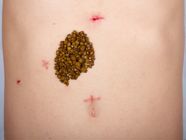Colonoscopy is a diagnostic examination that contributes to treatment and early detection of colon problems. Find out what is a colonoscopy? What is its importance? And a lot of information.
Colonoscopy
Colonoscopy is a medical procedure aimed at examining the large intestine (colon) and rectum to detect any abnormal changes. This procedure involves inserting a thin, flexible tube (colonoscope) carrying a light and a camera through the rectum into the colon, allowing the detection of any potential problems in the colon, such as polyps, malignant tumors, etc. (1)
Indications for a colonoscopy
The doctor requests a colonoscopy for the following indications: (2)
·Diagnosing colon problems: The doctor recommends a colonoscopy to determine the cause of some of the unexplained symptoms you are experiencing, such as: abdominal pain, hematemesis, chronic diarrhea, and others.
·Early detection of colon cancer: In general, all individuals should have a colonoscopy for early detection of colon cancer when they reach the age of 45 years, then repeat it every 10 years.
·Periodic follow-up for colon polyps: If you suffer from colon polyps, the doctor can recommend performing a colonoscopy annually to examine the colon again and remove these polyps, which reduces the risk of colon cancer.
·Treating colon problems: Sometimes the doctor inserts certain tools during the colonoscopy to treat some problems, such as applying a stent or removing polyps.
Colonoscopy Instructions
The doctor will provide you with an “instruction sheet” in preparation for the colonoscopy. Follow it carefully. These instructions may vary from one case to another, but they generally include the following: (3)(1)
- Low-fiber diet (3-4 days before endoscopy):
You can eat rice, pasta, bread, peeled vegetables and fruits, all kinds of meat, and eggs.
- Clear liquid diet only (1 day before endoscopy): You must stop eating any food and commit to drink only clear liquids the day before the endoscopy, such as: water, chicken or meat broth, coffee and tea, apple juice and grape juice, and it is necessary to avoid liquids colored red or purple.
- Colon emptying (1 day before endoscopy)
The doctor prescribes laxatives medications for you to start using the day before the endoscopy, in order to clean and empty the colon of food and take a clear image of the colon. These laxatives are in the form of oral pills, enema, or sachets that are dissolved in a certain amount of water to drink.
- Fasting from food and drink (two hours before the endoscopy or the night before)
Your doctor may tell you that you will need to stop eating, drinking even water at least two hours before the endoscopy, or overnight.
If you take chronic medications, such as heart, diabetes, hypertension, or anticoagulants medications, ask your doctor about instructions for taking these medications on days preparing for the endoscopy. He may tell you to adjust the dose or stop taking some of them before the endoscopy.
How is Colonoscopy Performed?
Colonoscopy takes approximately 30 - 60 minutes. Here are the steps: (4)(5)
1. Receiving intravenous medication: The doctor gives you anesthetics and analgesics intravenously, so that you do not feel any pain. You may or may not be conscious depending on the type of anesthesia, however, you will most likely not remember anything.
2. Inserting the endoscope: The doctor inserts a long, thin scope through the anus and into the colon. It contains a camera and light to record video inside the colon.
3. Inflating air into the colon: The endoscope blows an amount of air into the colon to expand it and create a clear image.
4. Colon examination: The doctor examines the colon wall for any abnormal signs or potential problems.
5. Resection or biopsy procedure: During endoscopy, if any small or abnormal polyps or tumors are discovered, the doctor can remove these growths or take small samples of suspicious tissue (biopsy) for examination in the laboratory.
6. Removal of the endoscope and recovery: The endoscope will be withdrawn slowly, and you will be transferred to the recovery room until the anesthesia wears off, and you will be able to return home on the same day.
Colonoscopy Results
The doctor will inform you if there are any problems or abnormalities in the colon immediately after completing the procedure, and after the anesthesia wears off. However, if your doctor takes a sample (biopsy), you may be asked to wait several days or weeks for the results. (6)
Your health deserves the best! Book your appointment in the Gastroenterology Department at Al-Ahli Hospital to perform a colonoscopy with confidence and comfort. Our department is equipped with a special endoscopy suite and a distinguished team that helps you take care of your health and detect any problems early.
Does Colonoscopy Have any Side Effects?
Colonoscopy is safe and its risks are few and rare, but they may include: (1)
- Colon bleeding after a biopsy or polypectomy.
- Perforation of the colon or rectum.
- Allergic reaction to anesthesia.
You may notice a number of side effects after a colonoscopy procedure, such as: bloating, gases, nausea, vomiting, irritation around the anus, cramps, and hematuria (if the doctor takes a biopsy). (8)(9)




